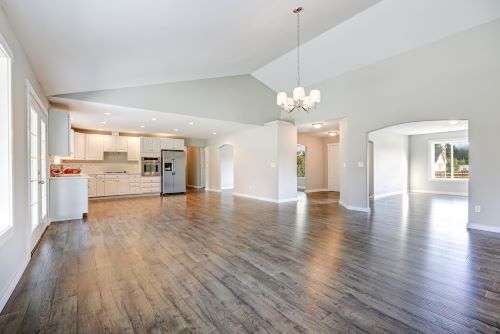
There are many reasons why a property might be unoccupied but, whatever the reason, it is important that you have the correct insurance in place. If something happens to the unoccupied property, you could end up losing everything you’ve put into it.
That’s where unoccupied property insurance comes in – it will protect your investment and ensure that you’re not out of pocket if anything goes wrong.
Why a Property Might Be Empty
Some of the reasons a property might be unoccupied include:
Death/inheritance
If a property owner dies, their heirs may not want to or be able to live in the property in the short term and until the property is sold. In this case, the property will likely be left unoccupied for some time.
Moving abroad
If you are moving overseas and need to move by a specific date, you may not be able to sell your property before you have to leave. This means that it will be unoccupied until it is sold.
Moved out and selling
Even if you are not moving overseas, you may still need to leave your property empty while it is on the market.
This could for example be because you need to buy the property you have set your heart on in the meantime or risk losing out. If your previous property takes a while to sell, this could mean that it is unoccupied for months or even years.
Having work done
Sometimes, you may need to leave your property empty while work is being carried out. This could be because the house is uninhabitable for a period of time.
For example, if you’re having an extension built, you may need to move out while the work is being done.
Delays between purchasing and developing a property
For developers, the purchase of a property for redevelopment is only the first step.
Another important step is to obtain the appropriate planning permission, which can sometimes be a lengthy process. Depending on the nature of the development, you may have to enter into consultations and meetings with local councils or residents.
Even if you don’t need planning permission, there are still other things you need to take into account such as Building Regulations. These set minimum standards for the design and construction of buildings. You will need to comply with Building Regulations regardless of whether you need planning permission or not.
If you’re carrying out work that falls within the definition of ‘development’, you will also need to apply for a ‘Lawful Development Certificate’ from your local authority. This is to confirm that what you’re proposing is allowed by planning law.
Alternatively there could be delays due to a Restrictive Covenant on the property.
Any of these reasons could mean that the time between purchasing the property and actually getting approval to develop it could easily be months, during which time the property will be unoccupied.
How Unoccupied Property Insurance Can Help
 While it is understandable that you might need to leave your property unoccupied for a period of time, it is important to remember that this comes with some risks.
While it is understandable that you might need to leave your property unoccupied for a period of time, it is important to remember that this comes with some risks.
If something happens to the property while it is empty, you could be left with a huge repair bill – or even worse, the property could be completely destroyed, by a fire for example.
Empty property insurance is specifically designed to protect your building if it becomes empty for a period of time. While your building is empty, you need to make sure that, if anything happens to it, you don’t suffer financially.
The potential issues range from floods or escape of water, to fires, squatters, theft and even vandalism. With this type of insurance in place, you can have peace of mind knowing that your property is protected.
The policy will cover the cost of any repairs or replacements that are required as a result of an incident, up to the limit of your chosen cover. You can also select optional extras such as cover for lost rent or alternative accommodation costs if your property is damaged and uninhabitable.
With unoccupied property insurance in place, you can rest assured that your building is protected against a range of risks, which is why it is so important. It will protect your investment and ensure that you are not left out of pocket if something goes wrong.
What to Consider When Choosing Empty Property Insurance
It is worth bearing in mind that unoccupied home insurance is usually more expensive than standard home insurance. This is because insurers see unoccupied properties as a higher risk, so you will need to be prepared to pay a bit more for your cover.
With this in mind, here are a few things to consider when taking out unoccupied home insurance.
Unoccupied property cover period
Most insurers will only offer cover for a limited period of time – often between 30 and 60 days. So if you are planning on leaving your property unoccupied for longer than this, you will need to find an insurer who is willing to provide cover for the whole period.
Declaring your intentions
When it comes to homeowners insurance, one of the most important things to remember is that you need to declare your intentions for the property to your insurer.
This is true whether you are planning on making minor changes or major alterations, and whether you intend to sell the property or keep it for rental purposes.
Failure to do so can create problems in the event that you need to make a claim, so it is important to be as upfront and honest as possible with your insurer from the start. By doing so, you can help to ensure that you are properly protected in the event of any unforeseen circumstances.
Extent of unoccupied property cover needed
 This type of insurance policy is a contract between the insurer and the insured, in which the insurer agrees to pay for certain covered losses that occur to the insured property. The insurer will only pay for these covered losses if they are caused by one of the perils listed in the policy.
This type of insurance policy is a contract between the insurer and the insured, in which the insurer agrees to pay for certain covered losses that occur to the insured property. The insurer will only pay for these covered losses if they are caused by one of the perils listed in the policy.
Some policies also include coverage for loss of use, which pays for additional living expenses if the insured property becomes uninhabitable due to a covered loss.
In order to ensure that your property is properly protected, it is important to disclose all plans for the property to your insurance company. This way, they can determine whether your plans will impact your coverage or require you to purchase a separate policy.
You need to make sure your unoccupied property insurance policy covers you for all these eventualities and gives you the option of different levels of insurance cover to suit your needs. Failing to do so could result in your claim being denied or only partially covered.
Types of cover for vacant properties
Your property is one of your most important assets, so it is crucial that you have the right insurance in place to protect it. Unoccupied house insurance is designed to cover your property when it is empty, whether that is during a renovation project or if you are away for an extended period of time.
Because unoccupied properties can be empty for a number of different reasons, there are a range of different policies available, depending on the level of protection you need.
For example, at the basic level there is FLEEA cover, which covers you for fire, lightning, earthquake, explosion or aircraft damage.
If you want more comprehensive protection, you can choose a policy that includes subsidence and water damage insurance.
Or, for full coverage, you can choose a ‘full perils’ policy that covers any issue with no exclusions.
If you are planning to rent out your property after the build is complete, you can also take out additional insurance such as loss of rent cover and building insurance.
So whatever your needs, you should be able to find an unoccupied home insurance policy to protect your property and meet your requirements.
Overall, unoccupied home insurance is a vital way to protect your investment. While it might cost a bit more than standard home insurance, it is well worth the peace of mind it will give you.
So if you’re planning on leaving your property empty for any length of time, make sure you find the right cover and policy for your needs.
Unoccupied Property Insurance Cover for Developers
 If you need to leave the property you are developing unoccupied for any length of time, make sure you arrange the correct cover to protect your investment. It could save you a lot of money in the long run.
If you need to leave the property you are developing unoccupied for any length of time, make sure you arrange the correct cover to protect your investment. It could save you a lot of money in the long run.
You need a broker who knows what an insurer wants in this regard and understands the industry.
That’s where Construction Insure comes in. We are specialist insurance brokers with years of experience in the construction industry.
We know what cover you need and we will place you with an insurer who will protect your risk. We also have access to insurers who allow cancellation of unoccupied property insurance on short notice, you won’t have to be tied into your policy for a whole year.
We understand that a property developer’s investment is important to them. That’s why we offer insurance policies to help protect their investment while the property is unoccupied.
Whether it is prior to planning permission being granted or actual building work beginning, or if the property is to remain unoccupied for a long time before being sold, we have a policy to fit your needs.
Our experienced team will work with you as a property developer to find the right insurance cover for your unoccupied properties, and you will have peace of mind knowing your investment is protected.
Contact us today to learn more about our specialist unoccupied property insurance cover.

